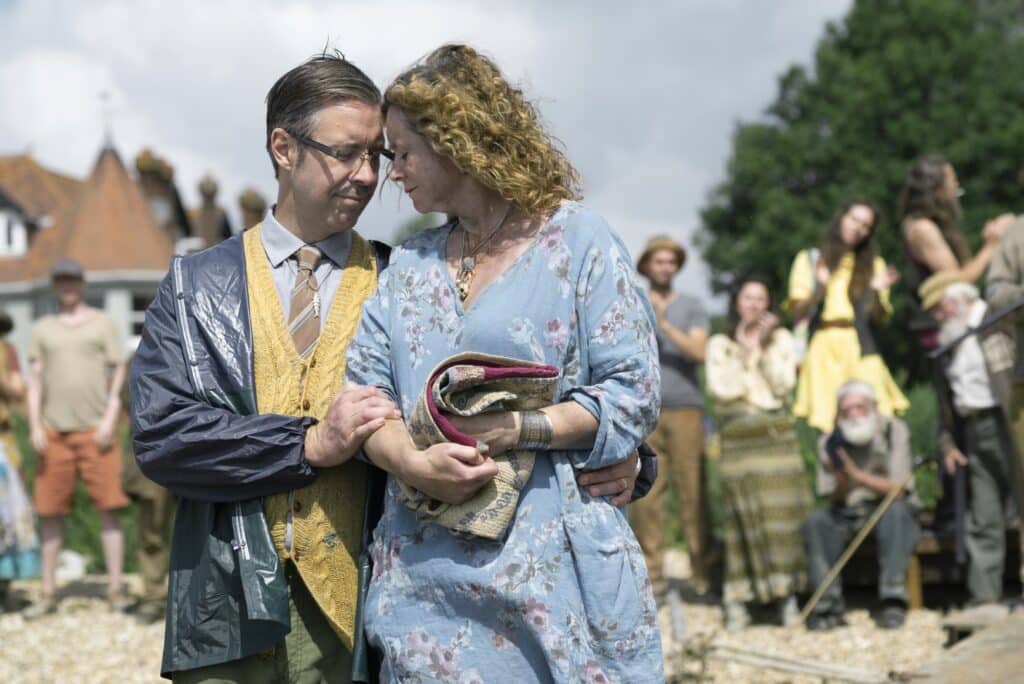Read also:
How to Watch FX Live Without CableHow To Watch AMC Without CableHow to Watch ABC Without CableHow to Watch Paramount Network Without CableHBO’s latest miniseries is The Wicker Man for the Brexit era, as Jude Law finds trouble in paradise.
HBO’s The Third Day feels a bit too timely in a year that seems like a non-stop roller coaster of confusion and loss; it comes across a bit too real despite its more fantastical elements. Set on the tiny island of Osea just off the Essex coast (a real place, as it happens), Felix Barrett and Dennis Kelly’s haunting six-part miniseries feels like a strangely welcoming expression of what it’s been like to live through 2020. The messaging might be heavy-handed, but in the hands of two leads, it becomes beautifully personal. There will inevitably be comparisons to The Wicker Man with its quintessentially English form of folk horror. Still, I couldn’t help but feel it more closely connected to Ari Aster’s masterpiece Midsommar and its grief and found family themes.
Split into two sections, Summer and Winter, The Third Day makes the most of its wild setting, showcasing both the lush, rampant beauty of summer against the stark grey and violet of winter. The island itself stands as a metaphor for the mourning that grieving father Sam (Jude Law) endures, from the way the tides come in and out to block the old Roman causeway, to the muddy bogs and strong currents surrounding the island. No matter how hard Sam tries, he can’t seem to leave Osea—and his grief—behind.
The locals of Osea have their festivals and rituals that would strike any outsider as odd, but it isn’t until the good-natured publican Mr. Martin (Paddy Considine) and his wife Mrs. Martin (Emily Watson at her very best) attempt to gaslight explain their customs that things begin to feel weird and threatening. The Martins use such a basic fear—that everyone but you is in on the secret—in a way that feels strangely elegant.

Where Midsommar was all about learning how to share grief and found families, The Third Day takes the opposite tack, where Sam would rather close himself off to the world and isn’t interested in becoming friends with anyone on the island. At least until a night of disorienting merriment at the local pub that more closely resembles a bacchanal. Sam, a stranger in this community of welcoming, weirdly religious oddballs, is embraced, kissed, petted, and welcomed as an old friend…or the proverbial fatted calf. Things are further complicated when Sam shares a room with another traveler, Jess (Katherine Waterston, in a strong performance). Like Odysseus lingering on Circe’s Island, Sam finds himself drawn back to Osea every time he nearly escapes.
Osea’s strangeness and its secretive people only bolster the feeling of bewilderment that comes with a genuinely unfathomable loss. When you lose someone important, everyone feels like a stranger. Every comforting gesture seems like a private celebration that says Thank God this pain is yours and not mine. As Mrs. Martin says, “Pain doesn’t know time” — an appropriate sentiment in a place that doesn’t seem to know time either.
While ‘Summer’ is deceptively welcoming and warm, Winter is anything but. In the cold, Osea is not the festive, frolicking paradise it was. Instead, it’s become openly hostile to Londoner mom Helen (Naomie Harris) and her two daughters, bold Talullah (Charlotte Gairdner-Mihell) and precocious Ellie (Nico Parker).
In the cold winter setting, the strangeness of Osea is amplified. The island people are experiencing their own kind of bereavement, and it has made them bitter and melancholy, their rituals and symbols more disturbing and arcane. The second part might have less mesmerizing terror than the first, but it serves the purpose of showing how differently people mourn, how some wear their pain on their sleeves while others lock it up inside themselves. It’s a theme echoed in smaller parts by the Martins, the sensitive husband, and his hurricane of a wife, who, in their own ways, are mourning the death of their way of life on the island.
Osea’s strangeness and its secretive people only bolster the feeling of bewilderment that comes with a genuinely unfathomable loss.
Harris’s powerful performance here adds concrete, real-world context to the first half (a twist that you’d have to be blind to miss). Still, in many ways, Winter presents a more frustrating narrative than the delirious and verdant Summer episodes. A sense of doom hangs over the Winter island like clouds heavily pregnant with snow. Helen, given every opportunity to leave, finds herself in the same predicament as Sam. Wanting, needing to get off of Osea, but never quite managing to do so. It lends a dreamlike—or nightmarish, depending on your point of view—quality to the series as a whole.
Some may find The Third Day profound. Others may find it clunky and gauche, but Harris and Law’s central performances bring a feeling of unexpected grace not often found in folk horror (Midsommar notwithstanding). Maybe in a few years, it will be too traumatic to watch, too similar to these days of unexpected loss, but for now—for 2020—it’s more cathartic. The only way out is through.
Fair warning to sensitive viewers: there are graphic images of death, both animal and human, suicide, and a sequence of drug-induced hallucinations that is both startlingly beautiful and eerie but may be upsetting to some.
The Third Day premieres September 14th on HBO.